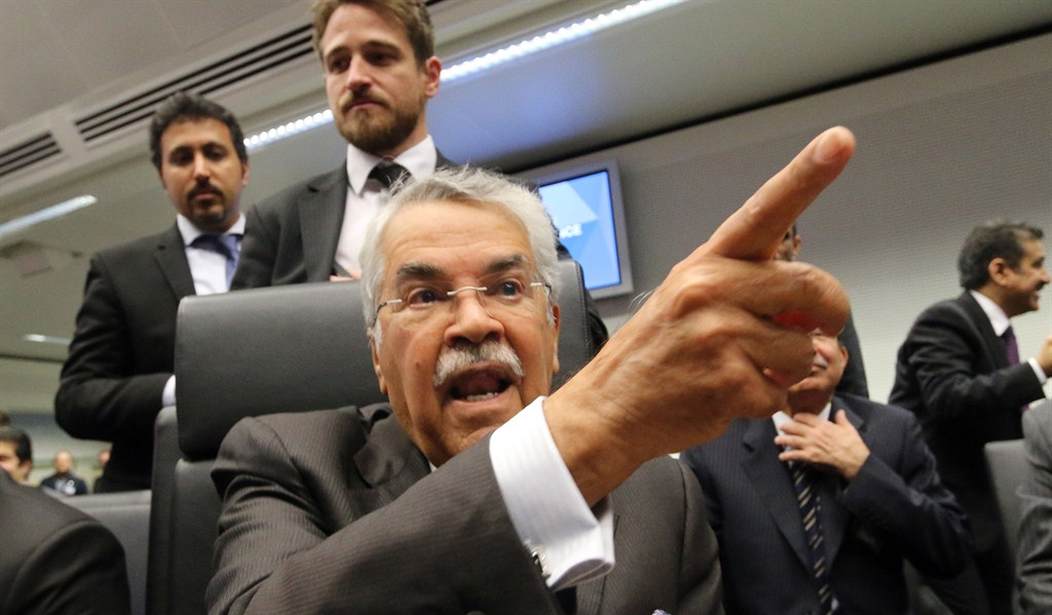Despite falling oil prices, the Organization of Petroleum Exporting Countries (OPEC) voted on November 27th not to cut production in order to boost prices. The key to this decision appears to have been the attitude of Saudi Arabia, which has long been the first among equals in the coalition. Not surprisingly, the decision led to further oil price declines, and led many observers to conclude that OPEC has largely lost the ability to upwardly influence the price of petroleum. But this determination ignores the wider geopolitical considerations that may be convincing Saudi Arabia to be perfectly content, for now, with lower prices.
With about 20 percent of the world's proven oil reserves and producing between 10 and 13 percent of the global oil usage, Saudi Arabia is the world's leading oil producer ahead of the U.S., China, Iran and Canada. Perhaps more importantly, with its developed and easily accessible oil fields, Saudi Arabia has some of the lowest "lifting costs" in the world. Some estimate that it only costs the Saudis less than $5 to extract a barrel of oil from its fields. This is stark contrast to the much higher costs in rival countries and offshore and of shale producers. This permits the Saudis to withstand a protracted price slump far easier than other countries. The Saudis can use this ability as a weapon to achieve its strategic ends.
Modern U.S./Saudi relations were shaped towards the end of WWII by negotiations between President Franklin D. Roosevelt and the Saudi King Ibn Saud. In return for Saudi cooperation over oil, the United States guaranteed Saudi Arabia military protection. Despite the clear ideological differences between a conservative Wahabbi Sunni Kingdom and a Western democracy, this policy has largely held for some 68 years. Saudi Arabia exercised moderation and consistency over oil supplies from the Arab Gulf. In return, the United States led an impressive Allied military defeat of an Iraqi threat to Saudi Arabia in Gulf War I.
Recommended
While the current dip in energy prices clearly does hurt Saudi Arabia, it hurts her enemies far more, particularly Iran and Russia, which has been a key enabler of Iranian power and an international pariah on its own. Putting pressure on Russia has also become a key strategic interest of Washington.
For many oil exporting nations, the tax revenues generated from petroleum constitute a major portion of government budgets and have become essential to the maintenance of long-term solvency. Nations like Russia, with oil generating 50 percent of tax revenues in 2013, according to the Ministry of Finance, are assumed to have a 'Budget Break Even Cost' (BBEC) of around $105 per barrel based on Citi Research's data. Obviously the current price, less than $70 per barrel, is placing a great deal of strain on President Putin's finances. Iran has a BBEC of some $131 oil. Recovering from recent sanctions, Iran has few currency reserves. Therefore, oil at $70 will necessitate an early cut in government spending, risking civil discontent and possible regime change.
Saudi Arabia is assumed to have a lower BBEC of some $98 per barrel. And although current prices are lower than that, over decades Saudi Arabia has accumulated vast foreign exchange reserves. As a result, many observers believe she can sustain her economic budget for a considerable time with oil selling at below $93 a barrel. Meanwhile, countries such as Russia, Iran and, particularly, Venezuela, which already is nearing default on its debt, must start cutting government spending to reflect depleted oil revenues. These outcomes are firmly in the interests of both Saudi Arabia and her longtime strategic partner, the United States.
And although U.S. consumers are now enjoying the benefits of lower fuel costs, which will help spark consumer demand, the threat to the U.S. energy industry should not be overlooked. U.S. oil companies have invested heavily in horizontal oil drilling and so-called fracking to increase well yields. U.S. domestic oil production has risen significantly over the past five years and now approaches 8 million barrels per day based on data from the U.S. Energy Information Administration (EIA). However, much of this investment was made on the basis of $100 oil. If the price stays below $70 for long, the continued viability of some smaller U.S. oil companies might be threatened, particularly in Texas and South Dakota. Citigroup Inc.'s recent forecast that the U.S. would pump 14.2 million barrels per day by 2020 could prove illusive and result in job losses.
However, there are more serious strategic concerns currently in play. The Obama Administration's recent engagement with Iran may be of great concern to the Saudis, who consider Iran to be a mortal threat. Currently, the U.S. and Iran are in protracted negotiations over Iranian nuclear capabilities. The U.S. appears to be willing to acquiesce to Iranian desires in exchange for more cooperation against ISIS.
These concerns may have escalated this week when it was announced that Iran had recently conducted air strikes against ISIS insurgents within Iraqi territory. U.S. Secretary of State John Kerry reacted to these revelations as a "welcome development." Although ISIS should be considered an enemy to both the U.S. and Iran, American acceptance of Iranian military intervention in Iraq can be seen as a clear shift in Washington's policy towards Tehran.
If such is the case, the Saudis may begin to feel 'dumped' by Obama, and may be tempted to turn more forcefully towards China, the world's largest oil importer, offering cheap oil in return for strategic protection against a new American-backed Iranian regional threat.
The effects of international recession and the U.S. 'oil boom' were slow to create a production glut because, until recently, production from Iran, Russia, Iraq and Libya was curtailed by sanctions and war. Cheap oil likely will protect and increase Saudi Arabia's oil market share.
The real costs of Obama's dropping the U.S.'s 68-year friendship with Saudi Arabia in favor of Iran are becoming increasingly apparent. If Saudi Arabia is forced closer to China, taking with her other Arab Gulf States (OAPEC), the long-range implications could be extremely serious for America and Europe.

























Join the conversation as a VIP Member